I was squeezed into the car we’d christened ‘Electric Furious’ (because it made noises like a dying electric car and didn’t have the power to get us up hills) with my three Spanish housemates (‘mes Espagnols’) and an American; windows down because there was no air-con and the same five reggaeton tunes on a loop because the radio didn’t work. It coughed and spluttered as we all tried to will it up the Fort-de-France motorway in hilly stop-start traffic, hoping this wasn’t the day it was going to break down (again). There was a full moon party at a bar in the north of the island, and our new friends from the October trip to the World Creole Festival in Dominica had told us to come. Drink-driving is a relatively normal thing, but for us generally inexperienced drivers the windy road back from Carbet was a scary prospect in the wee small hours. The Espagnols were arguing about the plan – one wanted to avoid drinking and drive back early. The others wanted to sleep on the beach, or in the car, or on someone’s floor, and go hiking the next day. In the end that didn’t really matter. You would always find a way home eventually. Probably hitchhiking or with a friend who you didn’t know was going to be passing by anyway. In the early days of our assistantship in Martinique it was all partying, exploring, and arguing about cars (or buying cars, or waiting for someone to show up who might sell or hire us a car, or trying to get to a garage to repair the bloody car again). I ended up accidentally buying two cars with mes Espagnols and became what I never imagined would be possible: a confident, parallel-parking Driver. On the right, in kmph, with backwards roundabouts, terrifying roads, and no sat-nav. And all this was worlds and worlds away from the life I’d left behind in Glasgow, and the person I’d been back then. Somehow I was having my 20s in my early 30s, and mes Espagnols had given me an exotic-sounding new nickname to live up to: Carlita.
A friend of mine described my move to the Caribbean as a self-actualisation mission, but I didn’t really appreciate this until I finally felt ready to move on a few weeks ago. The feeling came in a sort of epiphany moment out at sea and I felt I finally knew what I was doing with myself and that I had the tools to become who I wanted to be. When I’d left Glasgow I hadn’t even realised there was much I wanted to change (aside from a few of the things obvious at the time). But when I arrived one of my new friends described me as a ‘divorced Londonite’ and another one told me my closed and awkward posture made it look like I had a massive weight on my shoulders. Even though I felt like I was doing pretty well in my life, I’d never been able to answer the question ‘are you happy?’ positively. (I thought I’d already been through all my big changes and now I was ‘fixed’.) My past 3+ years on this island have wrought a slow revolution of change that has fundamentally shaped my personality and my philosophical outlook, and (I hope) has made it impossible to return to life as I knew it before.
Tl:dr – nature is good, spend more time with your friends, work is less important than we’re taught to think it is, and living abroad and challenging yourself is good for your eternal soul. Plus, for those of you who care (or want to do it yourself), a glimpse into the life of a Caribbean-based language assistant.
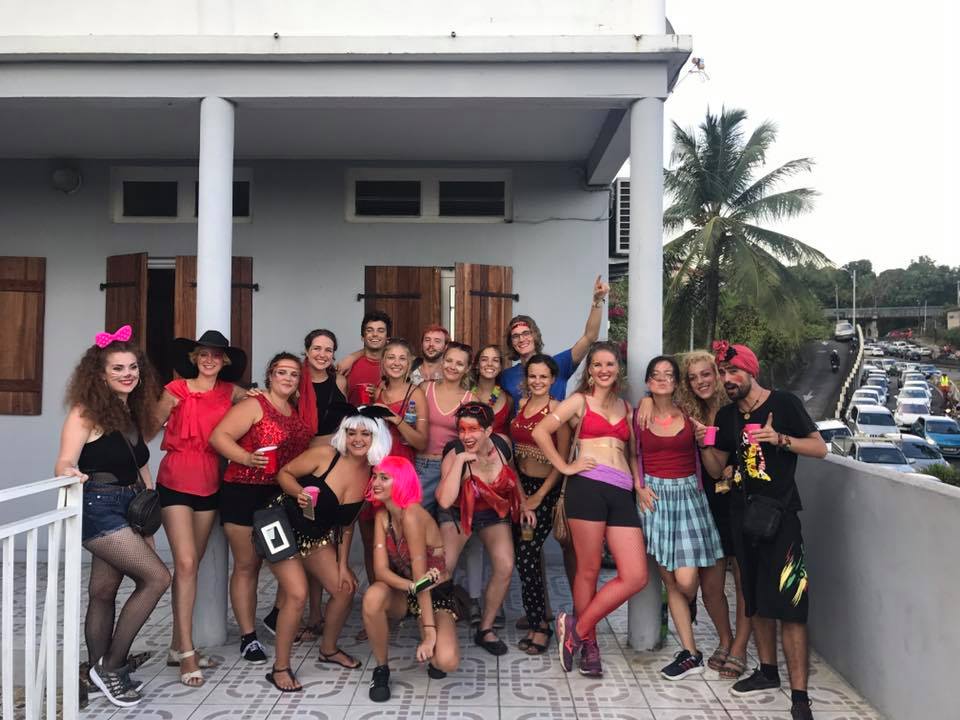
Livin’ the Life
Life in Martinique is pretty damned sweet as a language assistant. You’re relatively well-paid for a job that doesn’t take up a huge proportion of your time, you’re appreciated for being exotic, and there are official people allocated to help you out with your integration into the foreignness. You’re going to come away with a bunch of new skills, including fluency in another language, and a broadened mind. On top of all that, you’re literally in paradise. I didn’t live in a city so I was able to gorge myself on nature. There were the daily swims in the warm warm turquoise sea, most of my time spent barefoot with toes buried in sand or soothing mud, watching my more athletic friends shimmy up coconut trees and throw down free drinks, wild camping on the beach with just a hammock, and getting out into the hills and jungle whenever I could. Being a foreigner can make you explore and appreciate things more than you ever would in your own environment. You’re desperate to see everything and make the most of it all. I hope that if I ever go home, I’ll be able to behave like a visitor there too.
It’s not without its special brand of shittiness though; life here can also be extremely frustrating. Like, things in Martinique just don’t work in the same way as they do in the UK. It’s French bureaucracy, set back fifty years, with a Caribbean middle finger. This bureaucrazy (as I unaffectionately dub it) takes forever and there’s a lot of it (even for seemingly simple things like seeing a doctor). So I’ve really truly learned to appreciate and value any official document I manage to win from the French Administration: these golden prizes, worthy of being framed and hung on your living room wall. (To put this in perspective, French sailors-in-training have to do a whole module on the administrative system. The knee-jerk French response to a project proposition is, ‘what are the administrative implications of that?’) Frustrating as it is, however, I believe it has brought me to a new plane of spiritual zen. It’s the long hours spent sitting patiently in waiting rooms, wondering if anyone will actually have time to see you and if you brought all the paperwork (including the bits they sneakily left off the list but are going to ask you for anyway). Then the moment of acceptance: everything is going to take a looooong time. You have to stay calm, patient, and organised because nothing is going to happen quickly for you. And often it won’t happen at all because Computer Says No (no reason, just because, and that’s the end of it). So then you just sigh, and go away to find another solution, your day and many of the ones leading up to it entirely wasted. With the boat and everything that broke, plus the car and everything that broke, and the lack of public transport to get anywhere, there were fires to put out all the time. Always a new problem to be solved. But you just found a way to get on with it, and there was always a solution in the end. Now, after a hearty round of paperwork, I feel like I’ve had a good cathartic cleansing (and also that I deserve a bottle of champagne).
So anyway, when things don’t work or are slow and difficult, I don’t tend to get angry and frustrated any more. I chill out and try not to take things so seriously. I have a slow burner of tedious tasks to get done, and I sort of forget about them most of the time. They’re no big deal. ***ZEN***There are too many other things about life here to enjoy.
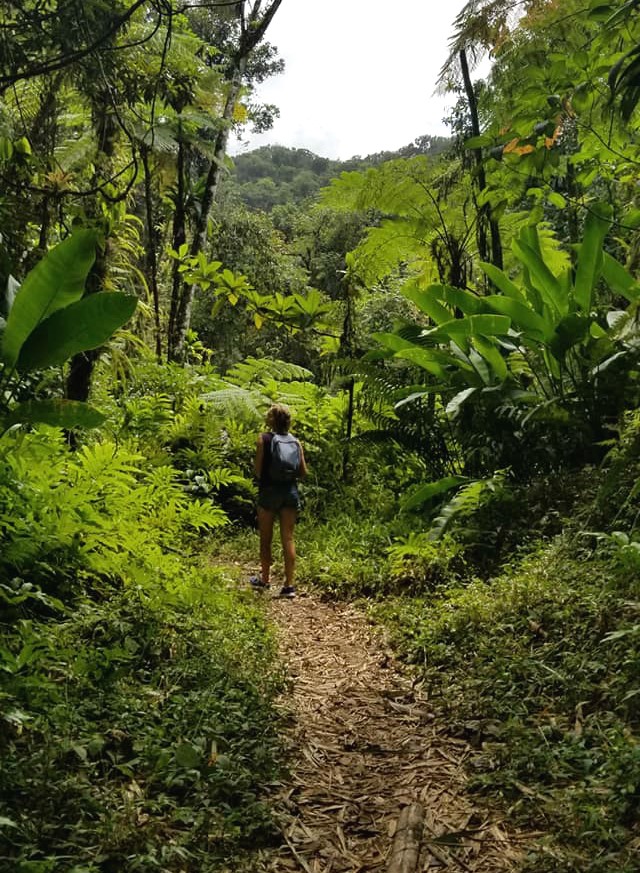
Taking Time
In Glasgow I was juggling a million things at once. I hardly ever went out or did things (even though it’s a cultural and foodie’s paradise), because I was a Freelancer and not working (ahem, procrastinating) = guilt. I had got used to my solitude in my wee one-bed flat. I’d revelled in living alone, but I hardly ever spent time with people. Living with mes Espagnols in Martinique was a shock to the system. We were in each other’s faces all the time. We fought over cars. We had to message the house WhatsApp group when someone was eating so that the others would go and eat with them. We had to share a very small washing machine which we needed to repair together when it broke for fear of losing our deposits. I couldn’t go and hide away in my room all the time. Plus, I had a self-contained salaried job so didn’t actually need to lock myself away kidding myself I was working.
Now these days I’ll go out at the drop of a hat. Someone says ‘are you up to anything right now?’, I say ‘no’ and off we go for a drink (sometimes disguised as ‘breakfast’), or a hike, or a day at the beach, or a zouk night. In Glasgow you planned all your social engagements weeks in advance. People were just so busy. Here you find this culture of open houses. Because you spend most of your life outdoors, it’s quite normal to turn up unannounced and hang around chilling out on your friend’s terrace. You bring some rum – or they offer you a ti punch in the way that British people offer you a cup of tea – and then you hang around for hours doing not very much (if you’re with local guys, normally you’re playing dominoes). Probably there’s a couple of other people already there. The boat life is pretty much the same as land life – except you swim over or crash into their boat with your dinghy and invite yourself for sundowners.
I take a lot of time for my friends, which some people could interpret as bumming around (if I achieve one thing in a day I’m filled with an unmerited sense of success, but that could also have something to do with the heat). Anyway I can see it’s beneficial because I’ve lost that closed posture, that social awkwardness. I can even do smalltalk sometimes (but not often). I can go to a bar by myself and feel OK about it. I can chat to a stranger on a bus. I’m a goddamn social animal now. I have a strong network of relationships, and in human society this is one of the fundamental things that keeps us going. I will never regret prioritising doing nothing with great people over working or achieving #goals.
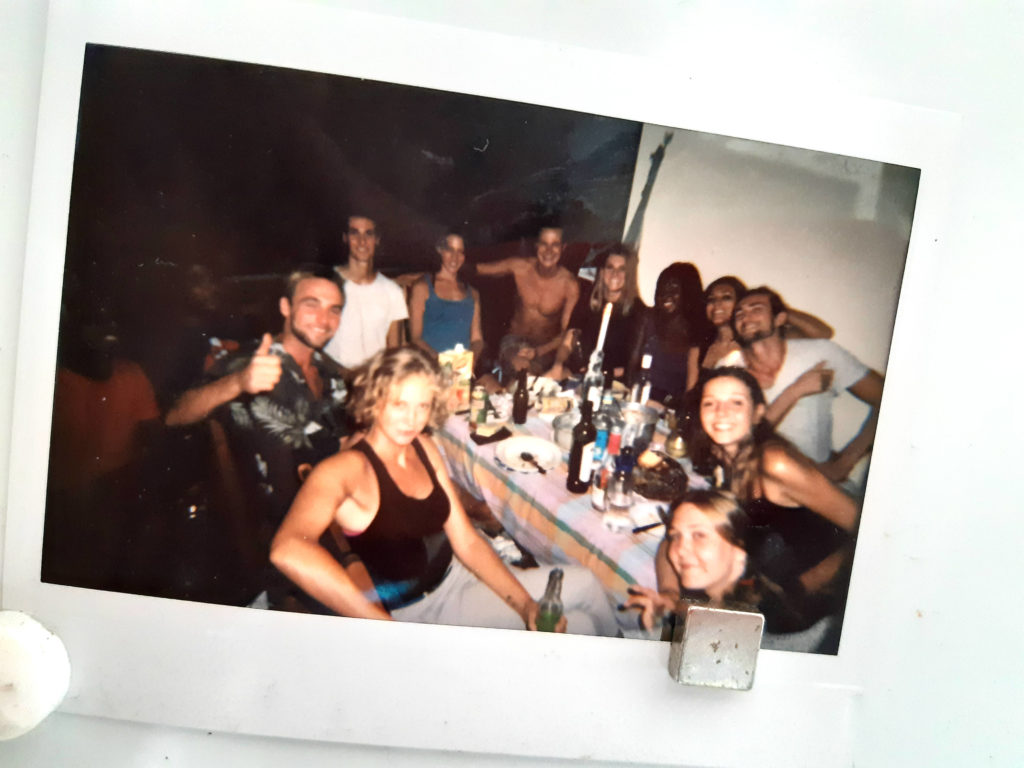
What’s your story?
My friend and I were chatting with a Martinique newbie, just shipped in from Paris and still wearing a sandy version of his chic city outfit. We were (as normal) in a bar in the middle of the day achieving not very much but reinforcing those all-important social connections. The newbie was pretending to work on his laptop. He was an arts freelancer too and he was trying to find a way to build his career in his new life (not easy in a land where the arts have very low representation). We discussed philosophies of work, because being an arts freelancer and ‘doing what he loved’ was still very important to him. I realised in that moment that for me, it wasn’t. I had enjoyed aspects of that life, but what I loved about my life here was all the things I was doing with my time that had nothing to do with earning money (aforementioned socialising, swimming in the sea, learning about sailing, speaking another language, fixing my boat, hiking in the jungle, cooking with tropical ingredients, writing when I got round to it, singing for friends). I had a job, and I liked it, but it was just for earning money. It wasn’t who I was. I met a sailor once who riled with disgust at the question ‘what do you do?’ ‘I never ask that,’ he’d said. ‘I ask – what’s your story?’
Where we were from (geographically, culturally), I realised, you need to aspire for an amazing job (do what you love) because it kind of defines who you are. If everyone’s working all the time, there’s no time for much else – so what you do for a living is very important. (Obviously not everyone subscribes to this way of being, but it’s a cultural trend.) When you tell someone your profession, the other person nods and believes they understand you now. Newbies to the island still ask me ‘what do you do?’ and it’s really annoying, because the thing I do for pay doesn’t begin to describe who I am as a person or the life I’ve lived up until now. Our newbie friend was fascinated by my argument, because he felt that by quitting his company job and becoming a freelancer in his field, he was achieving the next level of liberty and awesomeness. Hashtag freelancer goals! I’d felt like this freedom was a trap. That life had been so stressful for me.
Right now I have an employer who pays me a very small amount of money (compared to the expectations of my expensive education), but I have the freedom to explore whatever creative fields I like in my own time, without worrying that it needs to put food on the table. A friend of mine describes this as ‘refusing to prostitute your mind’. All my life I’d been taught that to be successful was to reach your academic peak and get a high-status high-paid job. But I like using my brain for my own things. To use it to earn money was a distraction, and so to do a job that doesn’t require all that much of it is a relief. I can throw myself into it. I’d always been such a high achiever and to accept that it was OK to act like an Erasmus student and just earn a basic wage so I could go and enjoy the place I was living in was a relief. I don’t need a challenging job to feel stretched. I’ve been on a mega mission of learning and self-development since I got here. I’ve been learning to sail. In French! I’ve been learning how to be a better social animal and appreciate all the human interaction around me. I can ask ‘what’s your story?’ and give an interesting response in return.
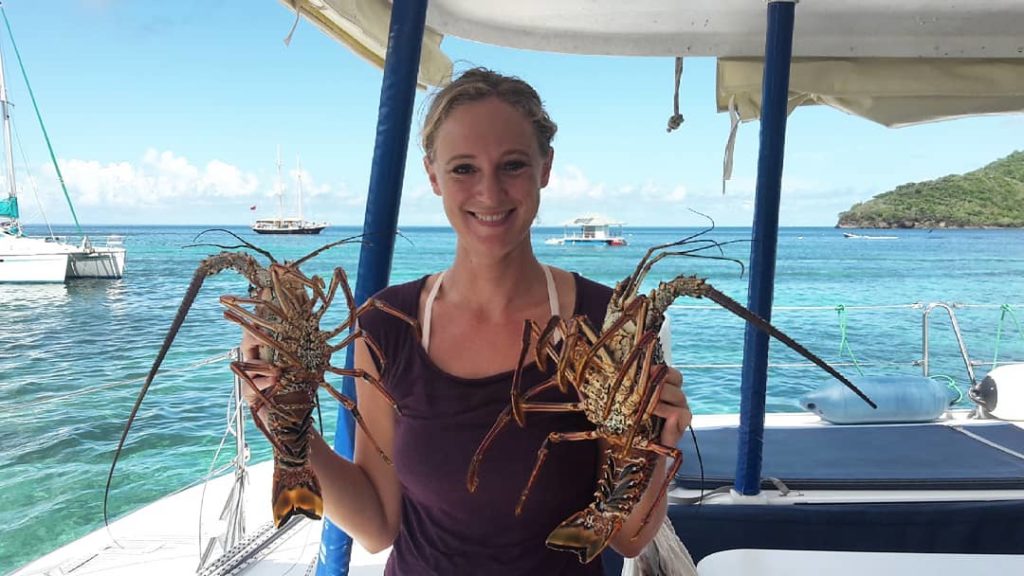
How to be Happy?
Shortly after I’d arrived in Martinique I wrote in my journal that I didn’t think I knew how to be happy. When I was reading it back I was shocked to realise I’d actually expressed that in words, considering I had a quite high opinion of how well my life was going at that time. But what I’d been taught to think of as success wasn’t really meaningful by my standards. I’m pleased to say that right now, I feel a profound sense of happiness with my life, even when things are hard (which they are, frequently). My attitudes are more relaxed – life here is so frustrating that if you don’t sit back and laugh at it, it grinds you down. And it’s so hot that if you get too worked up over something, you just combust. Best to just have another ti punch and chill out for a little while.
I think it has a lot to do with the idea that being in nature is known for making you feel good and giving you physical and metaphorical space to breathe. And that human relationships are really important because being lonely can literally be a killer. I also think it also has a lot to do with the fact that I chose this. People often say to me that I’m so lucky living in paradise doing what I do. But it’s not luck, it was a choice. And through making these choices and arriving at life philosophies which suit me, I’ve been able to shape myself in the way I want to. You find your own ways to create happiness, but I’m a control freak so living a life I’ve actively chosen (through doing things I’ve always wanted to do, and feeling like I’m in a perpetual state of development) is very important to me.
Anyway this happiness has impacted my work. When I had one of my first summer jobs when I was at uni I was awarded a ‘Little Miss Sunshine’ certificate ironically because I was such a gloomy cow. Around 12 years later I was given the same award for a different summer job (I heart summer jobs!), but…. it wasn’t ironic. I’d like to feel like that’s progress.
So this is what being a language assistant far from home in a very different culture, at a time of my life when I needed a big change, has achieved. Much of what I’ve written about isn’t a revelation – moving abroad is always going to change you. If you do it right, you’re exposed to a whole range of people outside of your familiar community. You’ll come embrace new ideas, new languages, new foods, and new approaches to living your daily life. Even more broadly, immigration and emigration can be massively positive opportunities for shared humanity and understanding, an exchange of ideas, and so much more. With the political grumbles in Europe trying to put a halt to this ancient and very very human trend, we must remember that it shouldn’t just be a privilege for rich white people (like me). Migration is universal.
Not all of these changes happened while I was a language assistant, and of course boat life brought in a whole new catalogue of things to learn from (more to follow), but that job was the catalyst for beginning a life in this new land. A life which is proving extremely difficult to leave.
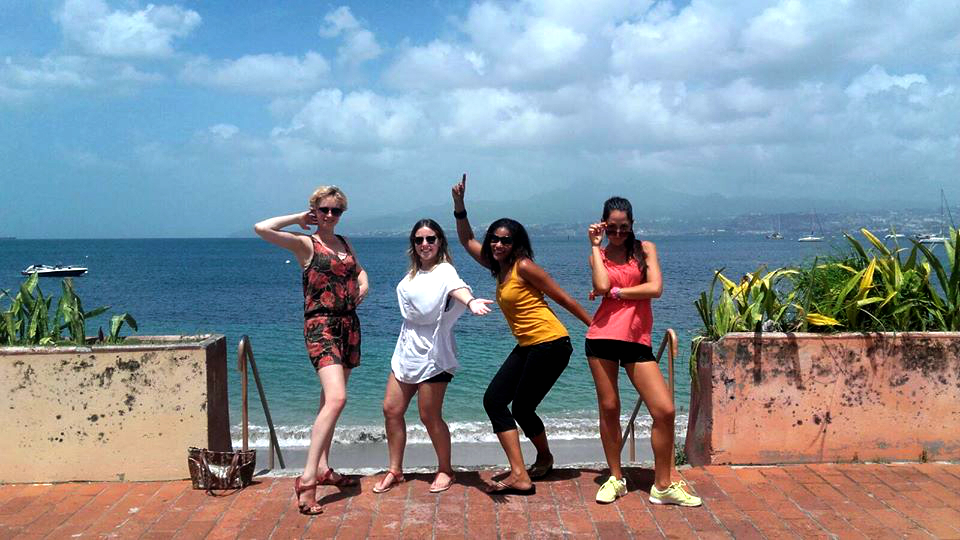


When you describe how the culture of the island and living on a boat changed you, I could totally relate to that. I used to be one of those “busy” people before I made some life changes. Reading the part where you described being in your little apartment, working, reminded me of how I used to be — so caught up in the “career” and the busyness of reaching for that success and everything that goes with it. The things I thought I needed to be happy.
Since I started out living aboard and sailing in Europe, I can’t say that the islands were solely responsible for teaching me to slow down and enjoy life. However, they have further contributed to the more relaxed way I view life now. I often think it would be very difficult for me to return to hustle and bustle of the life I once knew. I’m not sure I would be able to adapt to that lifestyle, after knowing what I know now.
I stopped a long time ago asking the expected question: What do you do? I really like the question: What’s your story? I plan on asking that from now on. I imagine you hear much more interesting responses. 🙂
When people say I’m “lucky”, I like to say that I’m not lucky but that I am fortunate. To me, luck means things happen to you that are completely out of your control or choice. Fortune is what happens as a result of choices. That’s how I view it.
Loved reading this post. Thank you so much for sharing this.
Such a great write up Carlita! I see so many westerners who after nearly 15 years in Mexico they still refuse to slow down. Trying to make all their conference calls with dodgy WiFi in a busy public area that’s loud and sometimes foul smelling makes me exhausted! And our lives isn’t about luck at all! Glad you’ve found a better pace of life 🙂
Dear Charlotte
That seems like a very hard post to have written.
There is quite a lot of opinion, some of which I agree with some I am debating to agree with.
Currently I am involved in this https://www.therapiece.org project.
I think you have found something where you are. You, I understand, are due to travel again.
Wishing you well.
David (a cousin)
I loved reading these! So wonderful to hear about your life, and draw parallels with my own.
Wow! That is a really inspirational piece. I wish I had read it in my early twenties (but then you wouldn’t have written it because you wouldn’t be here!!).
Thanks to the commenters for all your lovely thoughts – I appreciate it!